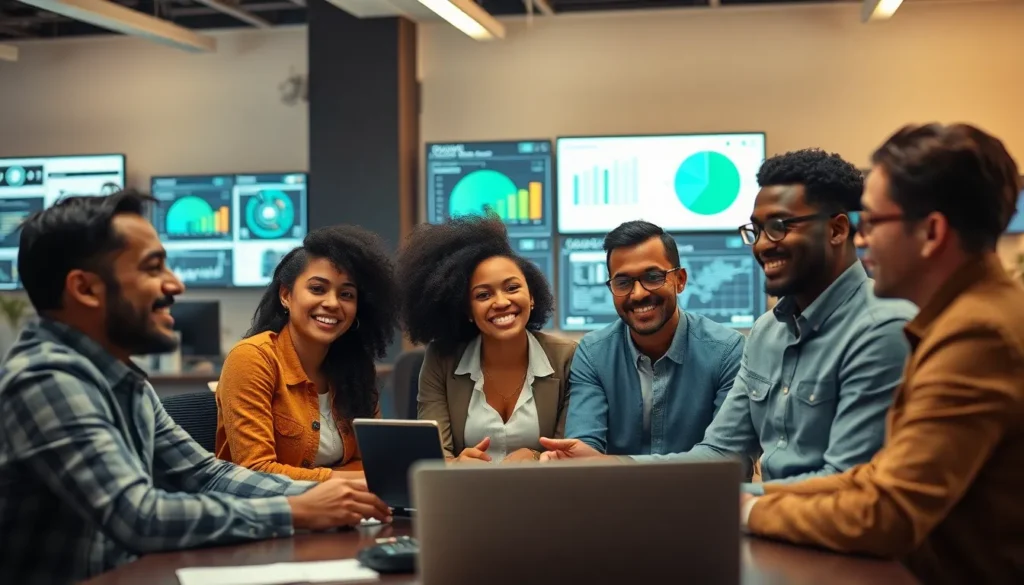In a world where technology evolves faster than a cat meme goes viral, the future is shaping up to be quite the spectacle. Imagine a reality where artificial intelligence helps you pick the perfect avocado at the grocery store or where your morning coffee brews itself while you’re still dreaming about that promotion. The evolving future isn’t just a sci-fi fantasy; it’s knocking at our doors, and it’s dressed to impress.
As society embraces innovation, the possibilities are endless. From smart homes that anticipate your every need to advancements in healthcare that could make doctors obsolete (sorry, Doc), the future promises to be both thrilling and slightly bewildering. Buckle up, because navigating this brave new world might just require a sense of humor—and a good Wi-Fi connection.
Table of Contents
ToggleOverview of the Evolving Future
The future evolves rapidly, driven by advancements in technology. Artificial intelligence plays a key role in transforming daily life. Tasks such as grocery selection and coffee brewing become automated, making everyday routines smoother. Smart homes utilize interconnected devices to enhance convenience, creating environments that respond to individual needs.
Healthcare shows significant improvements through technology. Wearable devices monitor health metrics, enabling early detection and personalized treatment plans. Innovations in telemedicine allow patients to access medical consultations from home, ensuring timely care.
In education, virtual reality offers immersive learning experiences. Students engage in interactive lessons that enhance comprehension and retention. Similarly, online platforms provide access to resources, making education more inclusive and accessible.
Society adapts to the changes brought by these technologies. While some welcome the integration, others may feel overwhelmed, navigating the complexities of modern life. It’s essential to maintain reliable internet access as connectivity remains crucial for maximizing the benefits of these advancements.
Embracing the evolving future requires a balanced perspective. Acceptance of technological changes accompanies a humorous acknowledgment of unexpected challenges. Many might find joy in witnessing the transformations that redefine their daily lives. While the journey presents uncertainties, it promises remarkable opportunities that ultimately enrich human experiences.
Technological Advancements

Technological advancements continue to shape the future, integrating seamlessly into daily life.
Artificial Intelligence and Automation
Artificial intelligence revolutionizes various sectors by performing tasks that typically require human intelligence. Examples include automating grocery selection and optimizing energy use in smart homes. Automation streamlines processes, allowing individuals to focus on creative and strategic thinking. Companies increasingly rely on AI to analyze vast amounts of data quickly, enhancing decision-making and productivity. With the growth of machine learning, AI systems adapt and improve over time, fostering even greater efficiency. Integration of these technologies leads to improved experiences across industries, from retail to healthcare. As AI evolves, its impact on workforce dynamics will reshape job roles and skill requirements.
Renewable Energy Innovations
Renewable energy innovations drive a shift toward sustainable living. Solar panels and wind turbines become more efficient and cost-effective, making clean energy sources accessible to households. Advances in battery storage technology allow for better energy management, enabling users to harness and store energy for later use. The adoption of electric vehicles contributes to a significant decline in fossil fuel consumption, addressing climate change concerns. Moreover, governments and organizations push for policies that support renewable energy projects, promoting environmental responsibility. By prioritizing sustainable practices, society embraces a cleaner, greener future.
Social Change and Impact
Societal evolution influences how people interact and work together. This transformation extends to communication methods, emphasizing instant access to information across various platforms.
Shifts in Communication
Technological advancements radically shift communication strategies. Social media networks offer platforms for instantaneous connections, allowing individuals to share information and experiences globally. Video conferencing tools facilitate remote meetings, breaking geographical barriers. In addition, messaging applications streamline daily conversations, fostering collaboration among teams and friends. As modes of communication diversify, the ability to convey messages clearly and effectively becomes crucial. These shifts in communication not only shape personal relationships but also influence business dynamics, as organizations adopt these tools to enhance productivity and engagement.
Changing Workforce Dynamics
Workforce dynamics are continuously reshaped by automation and remote work. Flexible work arrangements enhance employee satisfaction while attracting diverse talent from different locations. Companies increasingly adopt digital tools for project management, fostering collaboration across teams. Employees leverage technology for skills development, adapting to shifting job requirements. Traditional roles evolve as businesses prioritize innovation and adaptability, resulting in a more dynamic employment landscape. As organizations integrate artificial intelligence, individuals shift focus to creative problem-solving and strategic thinking, fundamentally altering workplace expectations.
Environmental Considerations
Environmental considerations remain integral as technology evolves, especially concerning climate change and sustainable practices.
Climate Change Adaptations
Climate change adaptations are crucial for mitigating the effects of global warming. Developing resilient infrastructure helps communities withstand severe weather events. Cities increasingly implement green roofs and urban forests to improve air quality and manage stormwater. Utilizing predictive models allows for better resource allocation, ensuring emergency services can respond effectively. Renewable energy sources, such as solar and wind, facilitate a decrease in greenhouse gas emissions, supporting broader climate goals. By focusing on adaptation strategies, societies enhance their ability to thrive amid changing environmental conditions.
Sustainable Practices
Sustainable practices are essential for fostering a healthier planet. Organizations prioritize recycling and waste reduction initiatives, minimizing their environmental footprints. Adopting circular economy principles ensures products are designed for reuse and sustainability. Implementing energy-efficient solutions reduces consumption while promoting cost savings. Communities engage in local food systems, supporting agriculture that prioritizes biodiversity and reduces transportation emissions. Collaboration among businesses, governments, and individuals amplifies the impact of these sustainable efforts, paving the way for a greener future.
Economic Trends
Economic trends reflect significant changes shaping industries and work environments in the evolving future. Technological advancements drive these changes, altering how businesses operate and how individuals engage in work.
Future of Work and Industry
Adaptations in the workplace are evident as automation becomes more prevalent. Industries increasingly embrace AI to enhance efficiency and productivity. Remote work arrangements are reshaping traditional employment structures, favoring flexibility and attracting diverse talent. Employees focus on developing skills that align with evolving job requirements. Organizational strategies now prioritize collaboration tools to facilitate teamwork and communication. New occupations are emerging that emphasize creativity and critical thinking rather than routine tasks.
Global Market Influences
Current economic conditions are influenced by globalization and technological innovations. Companies navigate international markets, requiring agility to respond to global shifts. E-commerce expansion continues to redefine retail dynamics, pushing businesses to adopt digital strategies. Supply chain disruptions highlight the need for resilience and adaptability. Sustainability considerations are shaping consumer preferences, driving demand for environmentally friendly products. Market players respond by integrating sustainable practices into their operations, setting clear standards for future business conduct.
The evolving future presents a landscape rich with opportunities and challenges. As technology continues to advance at a rapid pace, individuals and societies must adapt to these changes while embracing innovation. The integration of artificial intelligence and automation into daily life enhances efficiency and creativity, transforming industries and personal experiences alike.
Sustainability remains a critical focus as advancements in renewable energy and environmentally friendly practices take center stage. A commitment to collaboration among businesses, governments, and individuals is essential in building a greener future.
Navigating this dynamic environment requires a balance between embracing technological progress and maintaining a sense of humor about its complexities. With an open mind and a proactive approach, the evolving future can lead to a more connected, efficient, and sustainable world.

